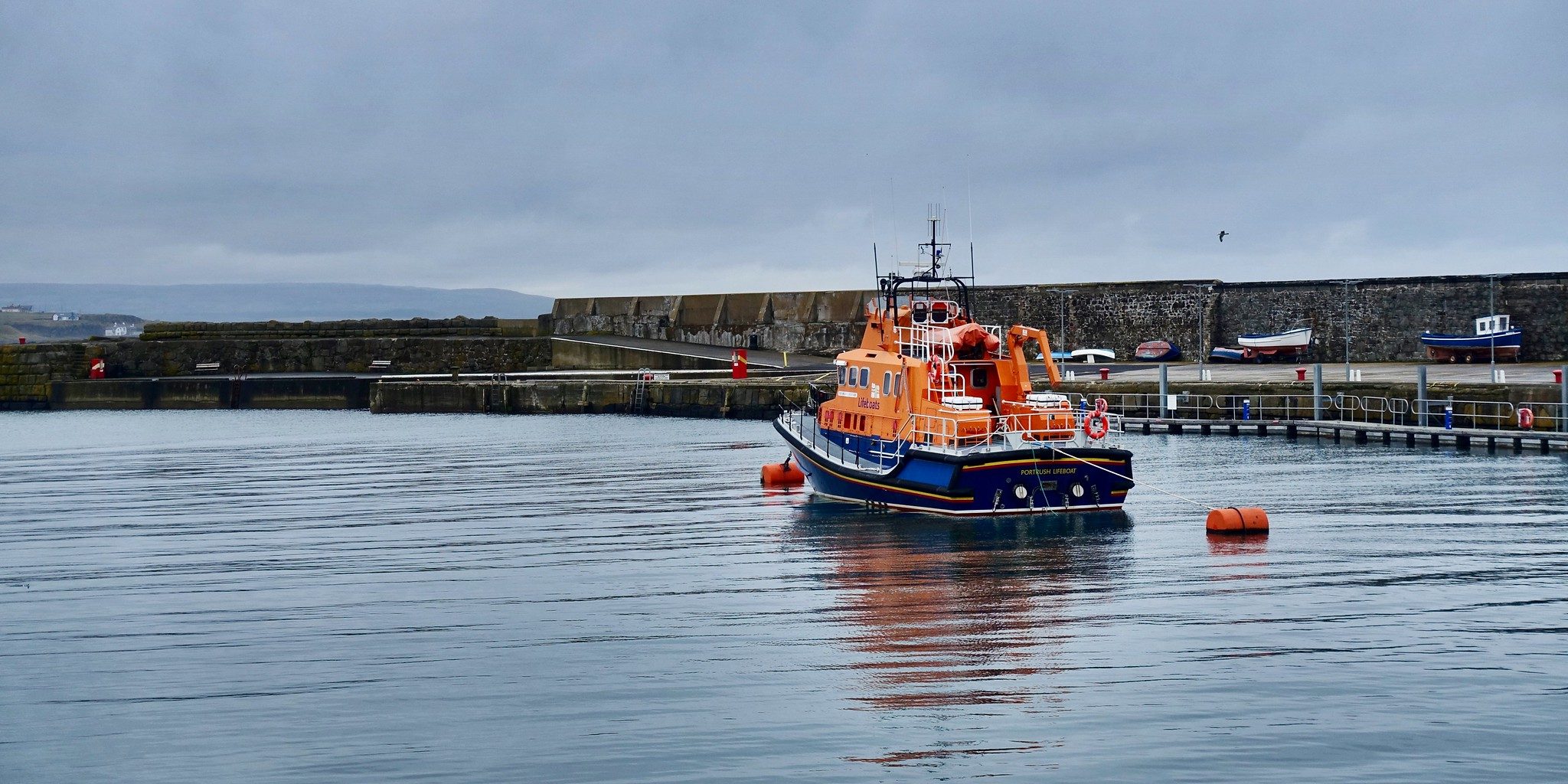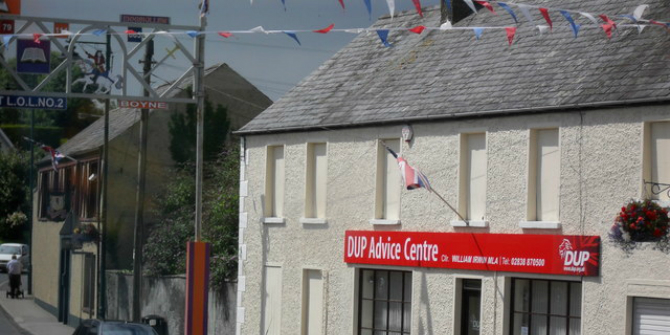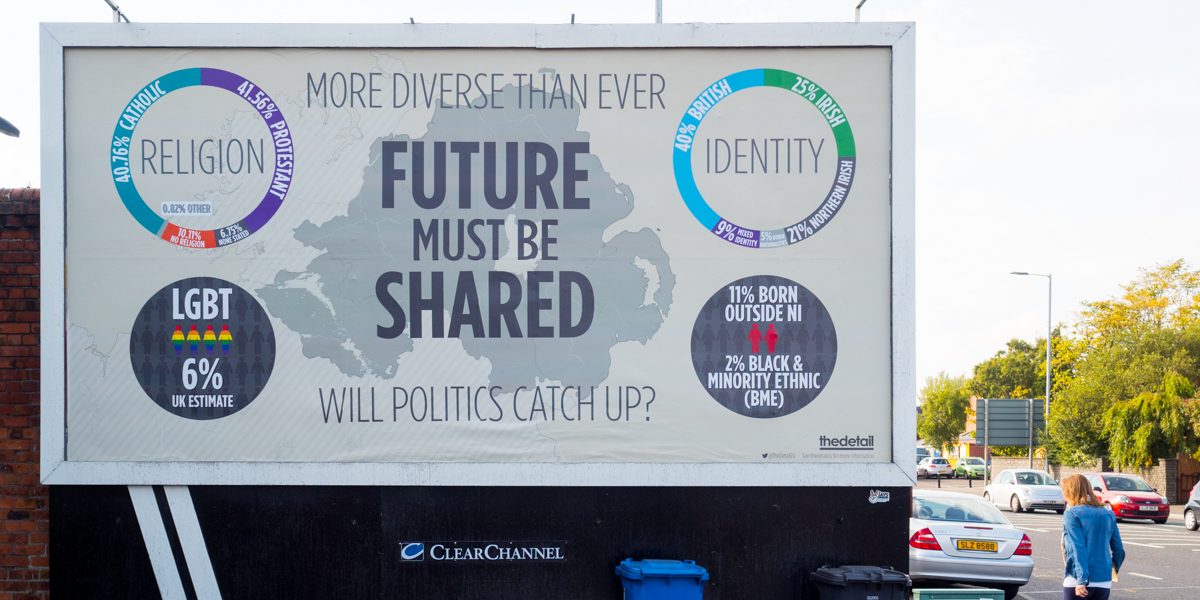Northern Ireland is now officially still in the customs territory of the UK and still an integral part of the UK internal market. Consequently, the Ireland/Northern Ireland Protocol that regulates this state of affairs is no ordinary international arrangement. Recent moves from the UK side have not been welcome by the EU. It is frustrated at the lack of readiness, compliance and, now, the trustworthiness of the UK. It, must, however, play the long-game, claims Katy Hayward (Queen’s University Belfast).
The thing about an agreement is that it involves more than one actor. The same is true about a border: it has more than one side. An agreement about a border would usually mean setting in place arrangements to coordinate what happens as things move from one side of it to the other. What the Protocol on Ireland/Northern Ireland does – as an international agreement on, amongst other things, the movement of goods across the Irish Sea – is very unusual for several reasons.
First, it is an international agreement that affects the internal boundary of one party. The Irish Sea border has always had some significance (e.g. live animals entering Northern Ireland from Great Britain having to meet strict rules on certification and checks) but this has been greatly increased as a result of the Protocol.
Secondly, the Protocol has different rules applying for goods moving in one direction compared to the other. The procedures for goods entering Great Britain from Northern Ireland are different from those going in the other direction. This does provide potential opportunities for NI-based businesses selling goods into GB, but it also brings complexities to the overall picture.
Thirdly, the rules that apply for goods moving from Great Britain to Northern Ireland (within the UK) are not the UK’s rules but those of the EU. The Union Customs Code and regulatory compliance with EU law are the rules that apply to goods entering NI from GB. Implementing these rules has been eased through various measures on the UK side (e.g. the Movement Assistance Scheme to cover costs of the official certification now needed to move goods into NI). The most strict of these rules have also been accompanied by grace periods, i.e. a UK commitment to align to certain EU rules across the UK for a period of time to allow the businesses to adjust to the new arrangements.
Fourthly, most unusually for an international agreement, it is just the UK who is charged with putting those rules into practice on either side of that Irish Sea border. Although there are EU observers, it is the UK authorities (in many instances, the staff of the NI Department for Agriculture, the Environment and Rural Affairs) who enforce the EU’s rules. This entails a great deal of trust on the EU side and a great deal of responsibility on the UK side.
When you add into this mix the fact that the same Protocol confirms that, despite what it actually means in practice, Northern Ireland is officially still in the customs territory of the UK and still an integral part of the UK internal market, we see that this is no ordinary international arrangement. No wonder the UK and EU are uneasy with it.

There are further complications in practice too. These are, for the most part, wholly predictable. Speak to any border agent and customs expert about putting in place a new regime for border management and they will tell you what is needed to make it work. Do people know what the rules are? Do they know how to comply with them and how easy is that? Is there enough time to roll-out the system (including to fix teething problems) and to familiarise everyone (inc. border agents, hauliers, traders, retailers) with it? Are the costs and risks of breaching the rules more than the costs of complying with them? In the case of the Irish Sea border, none of these conditions were in place at the end of the transition period.
The lack of preparedness is partly because of the complexity of the Protocol (see above), which has been downplayed by both parties to the Agreement. It is partly because the ‘transition period’ was really a transition into the unknown until the very last week of it, given that the potential for a No Deal was a live concern until Christmas Eve. It is partly because of the extraordinary conditions of the present time, with the coronavirus pandemic (lest we forget). And it is partly because the UK and the EU have not yet moved from ‘negotiating-bargaining’ mode to being co-guarantors and partners in this agreement.
The return of Lord David Frost to the scene has all too predictably brought a chill to the UK-EU relationship. The UK government’s announcement on 3 March, through the Secretary of State for Northern Ireland, that it was ‘taking several temporary operational steps to avoid disruptive cliff edges’ was framed by Lord Frost as being ‘entirely consistent with our intention to discharge our obligations’. It is true that – with the best will in the world (which is evident among most businesses in NI) – the new border regime is still far from ready for full implementation. Introduce the full force of the EU’s rules on 1st April and you really would see many more problems in NI business and retail than hithertofore.
However, the UK’s move has been interpreted by the EU as ‘unilateral action’ amounting to ‘a violation of the relevant substantive provisions of the Protocol … and the good faith obligation under the Withdrawal Agreement’. We are likely to see infringement proceedings commence once more over the Protocol. This will signal how seriously the EU views this breach but it will do nothing for good UK-EU relations, nor will it, I suspect, dissuade the UK. Indeed, the EU taking legal action will only confirm to Leavers and Unionists that the EU has unrealistic expectations about what it can demand to happen across an internal UK boundary.
The huge adjustment required by the Protocol should not be underestimated. The UK (and Northern Ireland) needs time to implement the new border management regime if the Protocol is to operate effectively and to cause minimal disruption to NI. It is not unreasonable for NI to expect this. The UK has exploited its hand in the Protocol (as the enforcer of the rules) to act in this way. But the rules it will be applying are the EU’s; it is still heading in the direction of implementation.
The EU is frustrated at the lack of readiness, compliance and, now, the trustworthiness of the UK. It may also be angry that the UK chose to take such action unilaterally rather than to negotiate it through the Joint Committee. Indeed, the first conversation the co-chairs had since Frost replaced Gove was only after the UK announced these steps. But, ultimately, this is a political move by Frost, and he won’t mind the fact that it infuriates the EU. However, in the wider scheme of things, every time the UK pulls off a move like this, the more it loses credibility as a serious international partner. Frost may play to the gallery, and the UK may play all the cards it has, but the EU needs to play the long-game.
This post represents the views of the author(s) and not those of the Brexit blog, nor of the LSE.







” An agreement about a border would usually mean setting in place arrangements to coordinate what happens as things move from one side of it to the other “.
In the 1979’s, HMG withdrew from it’s border posts & stations, unilaterally – relying on RoI documents to ‘prove’ export for tax & related purposes.
” Speak to any border agent and customs expert about putting in place a new regime for border management and they will tell you what is needed to make it work.”
Trust
Sadly, it’s been in short supply on the border. RoI were subject to serious threats, and attacks as a result of HMG actions & policies.
“The UK (and Northern Ireland) needs time to implement the new border management regime if the Protocol is to operate effectively and to cause minimal disruption to NI.”
This was available during talks, it wasn’t requested by HMG / Frost!
” The UK has exploited its hand in the Protocol (as the enforcer of the rules) to act in this way. ”
Again, unsurprisingly, the attitude of HMG to the RoI is colonial (the 1949 Act doesn’t recognise then as a foreign government)! (1986-1-W.L.R.-331).
“However, in the wider scheme of things, every time the UK pulls off a move like this, the more it loses” …
More
” … credibility as a serious international partner.”
” Frost may play to the gallery, and the UK may play all the cards it has, but the EU needs to play the long-game.”
This article plays to a certain audience, it is but critical of the EU than HMG/Frost. It is lacking in detail on what the expected’long-game’ is. (Apart from allowing widespread beaches).
I would add that there if nothing in the HMG/Frost/Lewis action which is within the protocol (Article 16 & appendices on operation). It is a beach of Article 16.
There are some follow ups – Coveney complains of the lack of trust, the EU Commissioner dealing with the UK financial agreements is a member of his look party.
Perhaps the article’s author could have posited that hngy should have played the long game, for financial axcessy for the city of London to the EU.
Trust, after all, is merely the likelihood of future behaviour. (This is why it’s easier to trust ac stranger. HMG’s actions are again untrustworthy – they are again attempting to destabilise the ROI, and reinstating the diesel debacle of the 80’s.
It is in effect, a trade war against the RoI, heading to the trade war of 1932-38 again (the result of that was Irish neutrality in WWII, loss if the treaty ports etc.
The respondent is a former Customs officer, policy analyst and university lecturer.
Although the trade war of 1932-38 certainly didn’t help Anglo-Irish relations, it’s a stretch as an explanation for Ireland’s neutrality in WW2. Both De Valera and the USA consul in Dublin explained it as due to the partition of Ireland. The MacDonald Commission from the UK, which tried to change the ROI view, also sought to do that be offering reunification (subject to the agreement of the Northern Irish Government).
My main concern is that NI should be in a state of health and welfare as it was before the Protocol. That is the responsibilty of the UK. The agreement to change the position of a controlling border was a bad decision by both parties. The RofI and the UK are responsible as sovereign countries for the land border and should never had allowed outside interference. For both countries benefit they should go back to a land border. What happens afterwards is subject to their abilities to confront any problems.
A land border ? Are you completely ignorant to the importance and the workings of the Good Friday Agreement?? The EU, Ireland, GB and USA involved in agreeing it and seeing it upheld? You would want the Troubles to really start again? Well the majority in N.Ireland want the Protocol to work. So does the rest of the world.
Sara, the two parts of Ireland should be capable of controlling their warlike factions other wise they are innefectual entities. Their people have knowledge of who is or is not a rebel and if the people do not support fight for peace, they have only themseleves to blame. Apperently there is an arms amnesty and therefore I presume all honourable people on both side have given up violence. It is only the EU that is insisting on hard borders so I again presume they do not trust the Irish to stick to EU rules of trade as it takes two to tango. Refuse to accept unlawful imports and the problem is solved.
Thanks for your reply. It is not a matter of men of good faith acting honourably for the greater good here in N.I. anymore. Those heady days of the post Blair/ Clinton and Jonathan Powell appeasement of terrorists for the sake of a future peace are long since gone. Destroyed by 20 + years of uncontrolled corruption and criminality by the DUP/SF thug duopoly in Stormont and their feral housing estate gangsters. All decent citizens here have long ago lost any faith in that political pipe dream in the face of our brutal local daily realities.
Too many local loyalist and to a much lesser extent, republican gangs, have not either disarmed nor given up violence. In the case of loyalism we have suffered over 20 years of blatant criminal extortion and terror with absolute legal impunity being gifted to DUP ‘stakeholders’ from housing estate ‘community leaders’ up to high local and Stormont political offices. The PSNI are constantly told to back off prosecution by ‘unaccountable’ Westminster committee men. The lack of any real criminal investigation into brutal abuse and murder of Belfast schoolboy Noah Donohoe being a recent heinous example of this – always spun in the totally state controlled press here, as for the sake of not upsetting the DUP hard unionist communities. There is no rule of law in N.I..
My concerns are rooted in experience of, in our case, relatively low level
persecution by politically protected local loyalist criminals. Anyone from off or who tries to stand up against them democratically becomes a target for mob abuse and worse. All of this continues because those all powerful unaccountable Westminster committee men both enable and protect those involved.
So, my fear of the UK Covert Human Intelligence Act of March 2021, with its frightening free for all criminal impunity for atrocities against civilians by British state agents, is no doubt equally matched by the fear being experienced by local loyalist criminals, both high and low, in regard to article two of the Northern Ireland Protocol which, for the first time in Northern Ireland’s 100 history, gives the EU jurisdictional power to finally implement full human and civil rights protection for ordinary citizens here. Something too many in GB, who should have known better, took for granted and wrongly assumed existed here in N.I., before this recent Brexit ERG/ DUP political coup.
Sara, many thanks for you reply, the topic is complicated and for those like myself the explanations when done dispassionately do help clear up some thoughts.These controlling organisations are looking after their own agenda and not always to the benefit of the people. The appeasement by leaders who could have been more firm in controlling rebels has allowed the escalation of a different situation. Namely one of no control from day to day. Just an ongoing scenario of argument and unnease. from lack of leadership.
Thank you AMOC, 4 March for clarifying
Katy Hayward: Ireland/Northern Ireland Protocol: the EU must play the long-game
To better comprehend one hidden legal motive behind this UK government unilateral decision to break international law over Northern Ireland, this timeline of recent parliamentary events might shine a light into the corrupt darkness.
On March 1 2021 Priti Patel’s Covert Human Intelligence Sources ( Criminal Conduct) Bill was given Royal Assent and passed into UK law.
In a letter dated March 2 2021 regarding the implementation of the Protocol, sent by Lord Kinnoul Chair of the EU Commitee, to Lord Frost, reference is made to the demand that the Joint Consultative Working Group on N.I. hold a dedicated meeting for ‘external stakeholders’ in N.I.. A veiled reference to Jonathan Powell’s LCC, the body that represents loyalist paramiltary organisations. This meeting was specifically to address the loyalist paramilitary concerns over Article Two of the Protocol, that deals with post Brexit human rights in N.I..
If the Northern Ireland Protocol stands as it is, the British state will face EU judicial investigation into their historical creation and support loyalist leadership gangs in N.I. when EU human rights law becomes fully operative in N.I. post December 2023. However, if the Protocol is legally breached and broken, the Patel Act will protect not just the British state but all of their state agents past, present and future from anybprosecution for atrocities against innocent civilians such as murder, rape, blackmail, theft and fraud etc…
Accordingly, some high and low profile N.I. Unionists, the present Brexit British government, (as well as some potentially compromised individuals in the Dail) are running scared of the EU joint protocol and/or Irish reunification and will continue to block a border poll as well as risk bringing down the British state with their rogue actions rather than allow decades long denied justice to be seen to be done and truth and reconciliation achieved in Northern Ireland.
The only comfort to be had for those who are suffering or have suffered at the callous hands of these politically powerful criminals is that nothing stays buried forever and that Nicola Sturgeon has refused to give Patel’s filthy Covert Agents Bill judicial power in Scotland.
I suppose we should be grateful to the European Union. Thanks to their good offices, we British have an unrivalled opportunity to discover what it like to be Chinese. Specifically, we are finding out what it like to have been Chinese during the era of unequal treaties.
No doubt, the French and Germans (and Irish) will cavil at the thought that they are cast in the role of the rapacious imperialists. Even so, there is no question that imposing an international frontier inside someone else’s country is a highly exceptional thing to do, and it done purely to oblige the EU’s obsession with the purity of its single market. It is, I suggest, a modern-day unequal treaty.
I agree with Prof. Hayward. Frost’s appointment suggests that changes are coming, whether the EU likes it or not. But is she right to assert, “However, in the wider scheme of things, every time the UK pulls off a move like this, the more it loses credibility as a serious international partner.”? Let’s ask ourselves this: which matters more to the Americans: argy-bargy over the Irish sea border, or the imminent departure of the Royal Navy’s “Queen Elizabeth” battle-group to the South China Sea, where it will be shoulder to shoulder with the United States Navy?
David, I agree, the unfortunate part is our country at the moment has not the ability to remove us from these bad agreements without the certainty of thinking it is correct in doing so. It seems to have a wish to be friends with a soon to be Dictatorship. More is the pity many European countries appear to be seeking the need to be dictated to.
“the Royal Navy’s “Queen Elizabeth” battle-group”
Are you serious? This ‘battle group’ is dependent on the US for planes – more of a bother than it is worth, really. It is minuscule compared with the US Navy. The only purpose it could possibly have is to give the impression that the US has allies (instead of vassals). And Biden does not care if he insults Johnston and his pack, who have previously denigrated Obama and his VP (Biden). The US is already pretty contemptuous of UK armed forces, having been compelled to rescue them on a number of occasions in both Iraq and Afghanistan.
On the other hand, Biden has to deal with a large and vociferous Irish American lobby, who can bring a great deal of pressure to bear on him. No competition.
“ there is no question that imposing an international frontier inside someone else’s country is a highly exceptional thing to do”.
Oh my. The irony …
As an Englishman I think it is appropriate to say that the behaviour of the British (English?) government and Mr Frost has been disgraceful. Anyone given an entre into the house of Lords these days where they have nice club facilities and instead of paying membership fees are paid £300+ for turning up should be slightly ashamed of their title, which will almost certainly have been a reward by the PM for services rendered. We think we live in a democracy; I am Mr somebody and so is Mr Frost. He has done a poor job for my country and is quite unworthy of being a Lord, whatever that is in a democratic country. He has been a major player for a government that has brought the shame of being regarded as untrustworthy internationally. There are all sorts of political misjudgements that are expected to make the country 4% poorer than it would have been. They will become more apparent later. In the meantime we should call it out as it is.